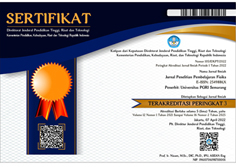STEM-Integrated PBL: Enhancing Science Literacy and Skills in Light Wave Material
Abstract
Full Text:
PDFReferences
Rukoyah R, Agustin M, Sopandi W and Sujana A 2020 Analysis of Science Literacy Skills Students of Class V Elementary School and Factors That Background IT International Conference on Elementary Education vol 2 pp 1843–51
Wang Y, Lavonen J and Tirri K 2018 Aims for learning 21st century competencies in national primary science curricula in China and Finland Eurasia journal of mathematics science and technology education
Cheng S-C, She H-C and Huang L-Y 2017 The Impact of Problem-Solving Instruction on Middle School Students’ Physical Science Learning: Interplays of Knowledge, Reasoning, and Problem Solving EURASIA Journal of Mathematics, Science and Technology Education 14
Tan K C D, Teo T W and Poon C-L 2016 Singapore science education Science education research and practice in Asia: Challenges and opportunities 155–74
Training Ontario M of E and 2007 The Ontario Curriculum, Grades 1-8: Science and Technology (The Ministry)
OECD 2016 PISA 2015 Results (Volume I) (OECD)
Schleicher A 2019 PISA 2018: Insights and interpretations. oecd Publishing
Kemdikbud 2020 Pusat Data dan Teknologi Informasi Kementrian Pendidikan dan Kebudayaan
Sani R A 2021 Pembelajaran Berorientasi AKM: Asesmen Kompetensi Minimum (Bumi Aksara)
Rao N K 2020 Advantages and disadvantages of student-centered learning Research Journal of English Language and Literature (RJELAL) 8 132–4
Singhal D 2017 Understanding student-centered learning and philosophies of teaching practices International Journal of Scientific Research and Management 5 5123–9
Toharudin U H S R A 2011 Membangun literasi sains peserta didik (Bandung: Humaniora)
Pakpahan R A 2022 Improving Students’ Scientific Literacy Through Problem Based Learning Jurnal Pendidikan LLDIKTI Wilayah 1 (JUDIK) 2 68–73
Uus Toharudin S H R 2011 Membangun Literasi Sains Peserta Didik Bandung: humaniora.andung: humaniora.
Alatas F and Fauziah L 2020 Model problem based learning untuk meningkatkan kemampuan literasi sains pada konsep pemanasan global JIPVA (Jurnal Pendidikan IPA Veteran) 4 102
Mundzir M F and Sujana A 2017 Problem-Based Learning Untuk Meningkatkan Kemampuan Literasi Sains Siswa Sd Jurnal Pena Ilmiah 2 421–30
Pujiastutik H 2018 Peningkatan Sikap Literasi Sains Mahasiswa Melalui Model Pembelajaran Problem Based Learning Pada Mata Kuliah Parasitologi Jurnal Biogenesis 14 61–6
Jasmi L, Marjuni M, Pohan N R, Asrizal and Mufit F 2023 The Effect of STEM Integrated Science Innovative Learning Model on Students’ Critical Thinking Skills: A Meta-Analysis Jurnal Penelitian Pendidikan IPA 9 841–8
Agus W 2020 Bahan Ajar STEM dengan Tema (Yogyakarta: deepublish)
Ismail I, Permanasari A and Setiawan W 2016 Stem virtual lab: An alternative practical media to enhance student’s scientific literacy Jurnal Pendidikan IPA Indonesia 5 239–46
Farid A M M, Faradiyah A R, Maghfira A, Lestari A P and Tullah H 2018 Pengaruh Media Simulasi Phet Menggunakan Model Discovery Learning Terhadap Hasil Belajar Fisika Peserta Didik the Influence of Phet ( Physics Education Technology ) Simulation Media on Physics Subjects Using Discovery Jurnal nalar pendidikan 6 105–12
Muzana S R, Lubis S P W and Wirda 2021 Penggunaan Simulasi PhET terhadap Efektifitas Belajar IPA Jurnal Dedikasi Pendidikan 5 227–36
Jauhariyah M N R, Suprapto N, Admoko S, Setyarsih W, Harizah Z and Zulfa I 2018 The Students’ misconceptions profile on chapter gas kinetic theory Journal of Physics: Conference Series vol 997 (IOP Publishing) p 012031
Zuhri M S and Jatmiko B Penerapan Model Pembelajaran Inkuiri (Inquiry Learning) Menggunakan Phet Simulation Untuk Menurunkan Miskonsepsi Siswa Kelas Xi Pada Materi Fluida Statis Di Sman Kesamben Jombang
Irianti S and Prasetyoputra P 2021 Rural–Urban Disparities in Access to Improved Sanitation in Indonesia: A Decomposition Approach Sage Open 11
Munawaroh F and Falahi M D 2016 Identifikasi Miskonsepsi Siswa SDN Kemayoran I Bangkalan pada Konsep Cahaya Menggunakan CRI (Certainty Of Response Index) Jurnal Pena Sains 3
Sundayana W 2015 Readiness and competence of senior high school english teachers to implement curriculum 2013 Indonesian Journal of Applied Linguistics 5 28–35
Asyhari A 2017 Literasi Sains Berbasis Nilai-Nilai Islam dan Budaya Indonesia Jurnal Ilmiah Pendidikan Fisika Al-Biruni 6 137–48
Dinda Cahyani V and Danika Pranata O 2023 STUDI AKTIVITAS BELAJAR SAINS SISWA DI SMA NEGERI 7 KERINCI Jurnal Pendidikan IPA 13 137–48
Muftianah J and Widodo W 2018 KUALITAS INSTRUMEN PENILAIAN LITERASI SAINS MATA PELAJARAN IPA UNTUK PESERTA DIDIK KELAS VII PENSA: E-JURNAL PENDIDIKAN SAINS 6
Adiwiguna S, Dantes N and Gunamantha M 2019 Pengaruh model problem based learning (PBL) berorientasi stem terhadap kemampuan berpikir kritis dan literasi sains siswa Kelas V SD di Gugus I Gusti Ketut Pudja PENDASI: Jurnal Pendidikan Dasar Indonesia 3 94–103
Ash-Showy N H, Ardiansyah A S, Niam M A, Sumarti S and Qomari N 2022 Pengembangan Bahan Ajar Perbandingan Terintegrasi Challenge Based Learning dengan Pendekatan STEM terhadap Kemampuan Berpikir Kritis Siswa CIRCLE : Jurnal Pendidikan Matematika 2 145–57
Rissanen I, Kuusisto E, Hanhimäki E and Tirri K 2018 Teachers’ Implicit Meaning Systems and Their Implications for Pedagogical Thinking and Practice: A Case Study from Finland Scandinavian Journal of Educational Research 62 487–500
DOI: https://doi.org/10.26877/jp2f.v15i3.18442
Refbacks
- There are currently no refbacks.
Copyright (c) 2024 Jurnal Penelitian Pembelajaran Fisika

This work is licensed under a Creative Commons Attribution-ShareAlike 4.0 International License.
Attention:
Starting vol. 15 issue 4 October 2024 JP2F has moved to a new website address
https://journal2.upgris.ac.id/index.php/jp2f/index
The submission process will only be served on the web above.
Copyright of Jurnal Penelitian Pembelajaran Fisika ISSN 2086-2407 (print), ISSN 2549-886X (online)
Gedung Utama GU.2.01 FPMIPATI, Universitas PGRI Semarang
Jl. Lontar No. 1-Dr. Cipto, Kampus 1 UPGRIS, Semarang
Email: [email protected]








